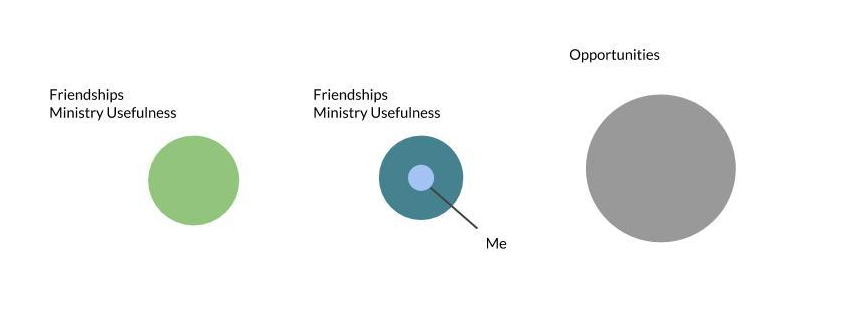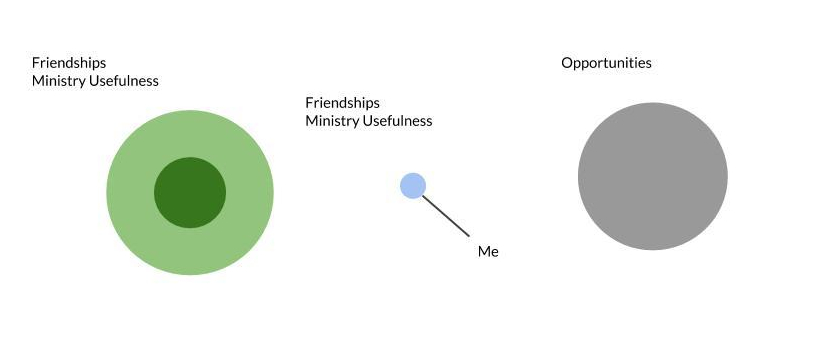“If you want to judge how well a person understands Christianity, find out how much he makes of the thought of being God’s child, and having God as his Father. If this is not the thought that prompts and controls his worship and prayers and his whole outlook on life, it means he does not understand Christianity very well.” (J.I. Packer)
I love when my son rests his head on my shoulder. There is something special that this little person feels safe enough to fall asleep in my arms. He plops himself snugly on my chest and dozes off.
A few months ago, I caught COVID and quarantined away from my wife and son. While I was sick, I had all the free time in the world that I had lacked during the early newborn days, but everything seemed boring and trivial. I missed being with my family.
When I finally tested negative, I was excited to see my son and put him to bed. However, as I was going through our routine, I was in for a surprise: my son had progressed in his head control! Rather than resting his head on my shoulder, he was awake and alert, bobbing his head and peering curiously around his room.
Now, setting developmental milestones aside, imagine if my son thought to himself: “Dad is back! I can’t fall asleep. I need to show him I’m all grown up, independent, and awake.” So, instead of collapsing into my arms, he raises his head and starts looking around, anxiously checking for my approval.
It’s a silly example, but there are parallels to our prayer lives as children of God. We reach the end of the day physically and mentally exhausted. We sense our need to pray but hesitate. Why? Partly because we’re weary but also because our tired prayers don’t feel worthy to bring before God.
This instinct often comes from a sincere place. We want to show reverence to God and imagine that “real” prayer looks a certain way. Yes, we know that prayer is not performance-based, but surely it should be more than these incoherent sentences and scattered ramblings. Right?
No. Just as I am happiest when my son rests his head on my shoulder, our Heavenly Father delights when his children rest in him. Prayer, then, is collapsing into the Father’s arms — through prayer, we cast our burdens onto God and rest in his strong, steadfast embrace.
Rest Your Head
God does not care about the length or eloquence of our prayers. He does not hear us because of our many words but because he is a generous, loving Father. We need not heap up empty phrases, because he knows what we need before we ask him (Mt 6:7-8)
But our Heavenly Father goes a step further than that: he invites us to pray especially when we don’t know what to say. In those moments, he ministers to us through his Spirit. Romans 8:14-16 teaches:
For all who are led by the Spirit of God are sons of God. [15] For you did not receive the spirit of slavery to fall back into fear, but you have received the Spirit of adoption as sons, by whom we cry, “Abba! Father!” [16] The Spirit himself bears witness with our spirit that we are children of God.
The passage continues in verse 26:
Likewise the Spirit helps us in our weakness. For we do not know what to pray for as we ought, but the Spirit himself intercedes for us with groanings too deep for words. (ESV)
The Spirit of adoption drives home the reality that God is our Father, and we are his children. And when our words fail, the Spirit himself prays for us, perfectly bringing our needs before God in a way we never could even on our best days.
What does this mean for us? It means weariness should drive us to our Father. On those days when our thoughts are jumbled, and we can barely string together a sentence, we should pray. We should pray when we don’t know what to say. We should pray when there is so much going on, we don’t know how to put it into words.
If you don’t know where to start, simply cry “Father!” Say it with faith and sincerity. Then, be still and let the Spirit apply the weighty truths of Scripture to your heart.
Remember that God welcomes you with open arms despite all your prodigal wanderings (Lk 15). Remember he is the Father of lights who gives good gifts to his children (Jms 1:17-18, Lk 11:11-13). Remember your riches in Christ. In his amazing love, God has made us his children, and if children, then heirs — heirs of God and fellow heirs with Christ (Rom 8:17). Bask in these truths and let them warm your heart.
Then, pour out your heart to him. It need not follow a prescribed formula. It can be as short as “I’m tired” or as long and rambling as you need. In his short booklet entitled, Enjoy Your Prayer Life, Michael Reeves describes Spirit-led prayer in this way:
The Spirit knows that we’re weak, that we struggle to pray and that we often don’t know what to pray – and his desire is to help us. This means that we don’t need to pretend to be giants in prayer or make resolutions that are out of our league. Since the Spirit knows our weakness, we can be real with our Father, accepting how babyish we are in our faith, and simply stammer out what’s on our hearts. In fact, that’s just the way to grow in our relationship with God. True intimacy is an acquired thing, something that develops – but it only develops with honesty. So if your prayer life is a bit ropey, I suggest starting again by stammering like a child to a Father. Cry for help. Don’t try to be impressive. (28)
Finally, rest in your Father’s care. Bring your anxieties and burdens to God and experience the surpassing peace of knowing he will provide for your every need (Phil 4:6-7, Mt 6:31-32). Don’t stay up late eating the bread of anxious toil. Let the day go, and trust that God gives his beloved sleep (Ps 127:1-2)
Not a Metaphor
This is the last post in a series on metaphors on prayer for the weary Christian. So far, we’ve explored how prayer is like:
- The sun on a snowy morning – it warms our dull hearts to be happy in God.
- An empty pail at the ocean – through prayer, God fills our empty hearts so we can pour ourselves out in service to others.
- Looking up and seeing the sky – it expands our self-centered perspective and humbles us before the majesty and love of God.
In all of these posts, I’ve compared God to something in the natural world. We can easily call to mind the warmth of the sun, the immensity of the ocean, or the expansiveness of the sky. These stark images help shake us awake to God’s greatness and majesty.
But these are only metaphors. God may be like the sun, ocean, or sky in some ways, but he is not those things. But God is a Father. He has always been a Father, loving his only begotten Son in the Spirit for all eternity. And in the Gospel, he has become our Father. What amazing love! It is the most intimate of images, and it is fully true for us in Christ.
I will end with Martyn Lloyd-Jones’ profound comment on the opening words to the Lord’s prayer:
“Do you know that the essence of true prayer is found in two words…’Our Father’? I suggest that if you can say from your heart, whatever your condition, ‘My Father’, in a sense your prayer is already answered.”
Come in your weakness and weariness and pray. And as you remember who he is as your Father, and who you are as his child, you’ll realize you have all you need.











